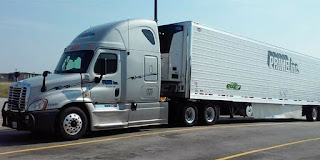 |
| trucks.com |
Oct 16, 2018 On Oct. 3, the US Supreme Court heard oral arguments in New Prime v. Oliveira, No. 17-340.
New Prime, Inc. is a national trucking company that recruits and trains new drivers through an apprenticeship program. Student apprentices participating in this program are unpaid, except during one phase of the program when they receive 14 cents per mile driven. New Prime waives the tuition of student apprentices who agree to work for New Prime for one year after completing the program.
After Dominic Oliveira successfully completed the apprenticeship program, New Prime encouraged him to become an independent contractor and referred him to other entities with offices in the same building and owned by the same company as New Prime to help him form a limited liability company and to secure a truck. Oliveira then signed an Independent Contractor Agreement with New Prime. The contract specified that there was no employer-employee relationship between Oliveira and New Prime, and that Oliveira was an independent contractor. The contract also contained an arbitration clause.
Oliveira alleges New Prime underpaid him and exercised such control over him that he was unable to work for other companies. He stopped driving for New Prime as an independent contractor. He did, however, later rejoin New Prime as a company driver. Dissatisfied with the pay as a company driver as well, Oliveira sued New Prime in the US District Court for the District of Massachusetts in a putative class action proceeding. Oliveira alleged that New Prime had failed to pay minimum wages under the Fair Labor Standards Act and the Missouri minimum wage statute. He also claimed breach of contract or unjust enrichment. New Prime insisted that Oliveira arbitrate his claim.
Oliveira has mostly prevailed with his claims in the lower courts. When oral arguments were heard by the Supreme Court, only eight justices were sitting, and since Oliveira prevailed in the lower court, he only needs four votes to tip the scales of justice in his favor.
If the Supreme Court rules in Oliveira’s favor, trucking companies might have more difficulty labeling drivers as independent contractors. Companies might also be prohibited from requiring independent contractors to settle issues via arbitration. Those drivers could sue in court, and the cases could even involve class actions.
No comments:
Post a Comment